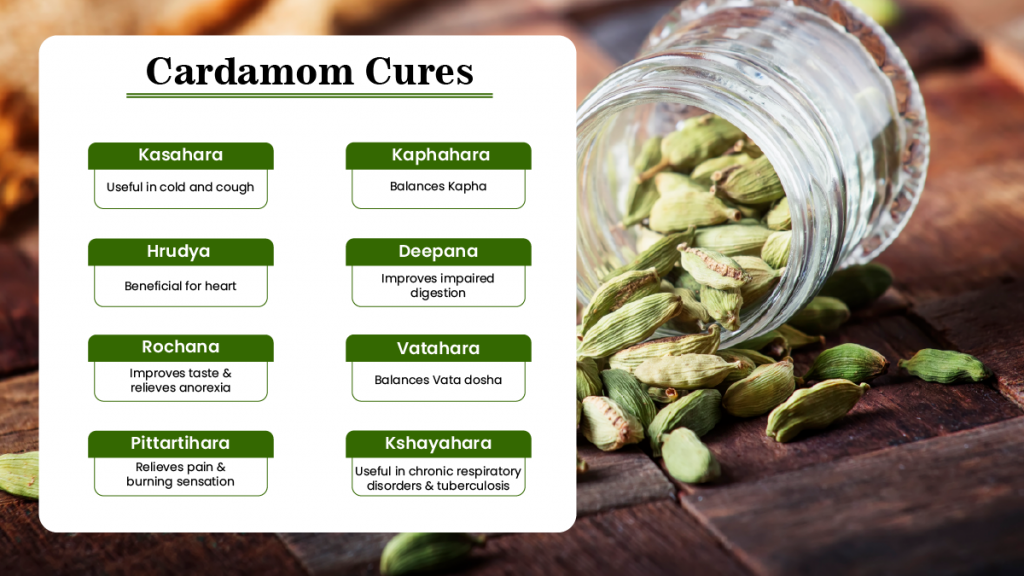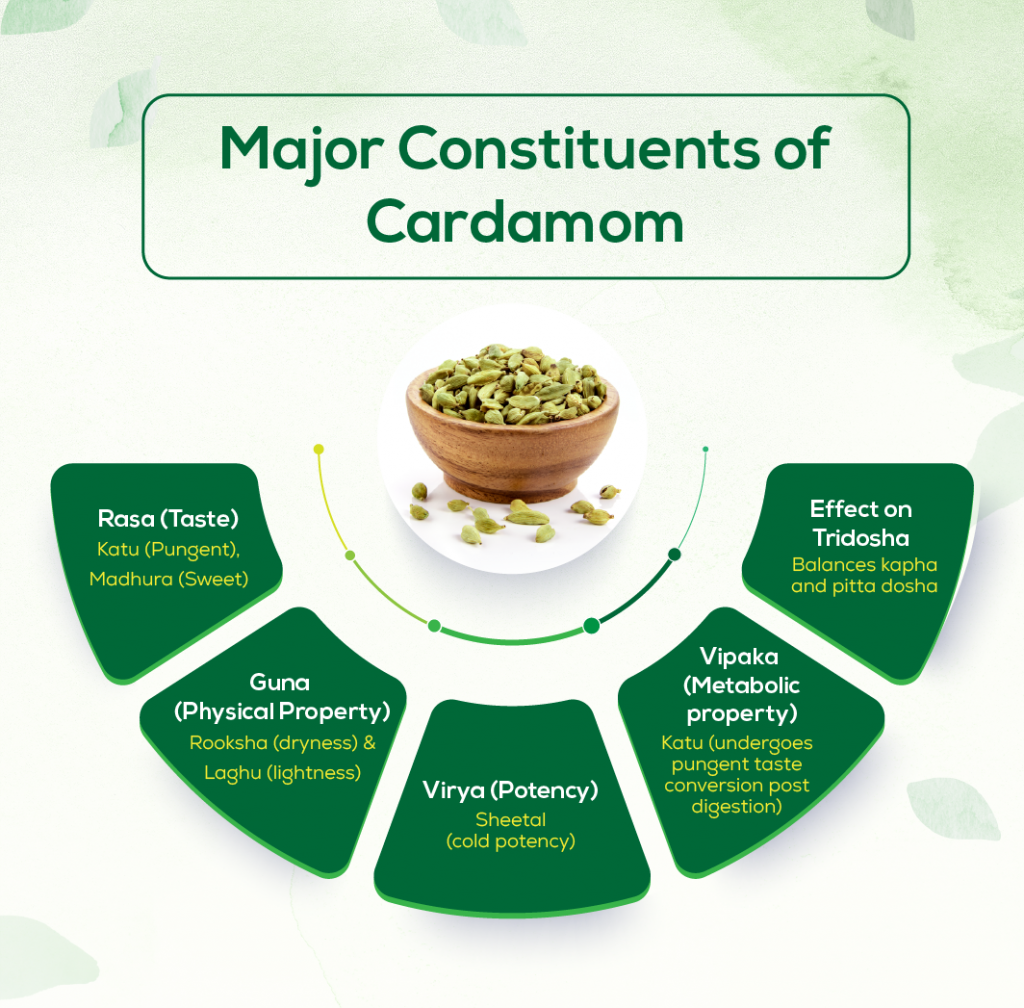Chapter 6: Cardamom
It has been my habit to offer choti elaichi or Cardamom to my guests after food. At first, it was just a formality that I had picked up from my mother and her from her ancestors. But now, when I prescribe cardamom to my patients, I know its importance more than ever.
We pick up some habits from our parents without realizing their essence. Hence, without wasting much time, I introduced my little girl to the health benefits of Cardamom. It was quite enlightening for her. I am sure it is going to be insightful for you once you are done reading the blog.
Cardamom or elaichi is an important part of our cuisine and sweets. It is known to have a bevvy of health benefits including Acidity, vomiting, detoxifying the body, fighting depression, boosting immunity, alleviating hypertension, and curing joint pain.
Cardamom has a papery exterior with small black seeds on the inside. It is used in several drinks and sweets to enhance its taste. It is known globally for its rich culinary properties that make it an expensive herb. However, in Ayurveda, the herb is beneficial for various gastrointestinal disorders, mental relaxation, respiratory complaints; favours wound healing and reduce the effects of poisoning.
Uses of Cardamom

Let’s have a glance at the properties and benefits of Cardamom in detail.

Eliminates Cough
Cardamom is a kapha balancing herb, it eliminates cough from the respiratory tract. It is an excellent spice in upper respiratory complaints, like cough, cold, sore throat, tonsillitis and hoarseness of voice.
Relaxes Sore Throat
Cardamom or choti elaichi aids in fighting the underlying infection responsible for sore throat and cold. It reduces inflammation, throat irritation caused due to a regular cold and aggravated kapha. To relax a sore throat you can have 2 cups of cardamom tea twice a day. It will give you a soothing feeling as well as reduce inflammation and irritation inside the throat.
Alleviates Heartburn & Flatulence
Heartburn or flatulence means impaired digestion or acidity. The aggravated pitta causes heartburn also improper digestion leads to excess vata formation and in an attempt to remove this vata from the body, burps and passing flatus occur. Cardamom’s sheeta virya or cold potency pacifies pitta by neutralising excessive gastric acid formed in the stomach. In addition, its deepana property helps to improve digestion and also pacifies vata, thus relieving flatulence.
Halitosis
Halitosis or bad breath is a result of poor oral hygiene, indigestion issues and worm infestation. Aversion towards food, nausea are a few symptoms associated. Cardamom being an aromatic herb cleanses and refreshes the oral cavity, has an anthelminthic effect, facilitates digestion and cures bad breath.
Reduces Headache
According to Ayurveda, headache is associated with an increase in Vata dosha along with pitta or Kapha. In patients with chronic constipation, stress, lack of sleep or exposure to wind, vitiation of Vata occurs and causes headache. This usually presents as a severe headache that subsides with head massage, rest or oil application. Pitta, on the other hand, causes a headache in which the pain is excruciating and is usually felt on the temple region of the head. Nausea is usually experienced in this type of pain. Regular intake of Cardamom is beneficial in headaches due to pitta dosha. Cardamom being aromatic, sweet in taste and cold in potency reduces pitta and also headache.
Controls Hypertension
Rakta gata Vata or elevated blood pressure in the arteries can be a result of stress, anxiety, particular disorder and acidity.
Cardamom is known to regulate high blood pressure. Cardamom being sweet in taste, cold in nature pacifies pitta. Being sukshma (it can gain access to the deeper tissues), hridya and aromatic help to relax and calm the mind and stress, this facilitates proper blood circulation lowering the risk of heart disease.
Cures Bronchitis
Bronchitis is the inflammation of the lining of bronchial tubes, which causes cough and shortness of breath. Cardamom reduces inflammation and kapha by releasing excess mucus in the lungs and the respiratory tract. It facilitates effortless breathing.
Burning Micturition
Overexposure to sun, intake of oily & spicy food causes burning sensation post urination. Having elaichi powder with medicated water of coriander seeds relieves burning.
Irritable Bowel Syndrome
Cardamom is known to improve digestive issues by its deepana (appetizer) property. It also pacifies pitta and detoxifies the body with its vishaghna ability. It is really useful for people suffering from irritable bowel syndrome or grahani that is caused by a disturbance in pachak agni (digestive fire).
Cardamom’s deepana property helps to cure indigestion and balances the pachak agni. It reduces intestinal cramps, aids digestion and soothes the stomach. Cardamom can help if taken regularly, especially in case of weak digestion or indigestion.
Anti-poisonous effect
Local application of cardamom powder at the site of a bee sting or insect bite proves beneficial. The anti-poisonous action helps to reduce pain, swelling, burning sensation and irritation at the site.
Adding elaichi to food preparations enhances the taste and aroma of the recipe. This also aids in the proper digestion and nourishment of the individual.
Wound healing
Elaichi is an essential ingredient of Eladi gana. It is highly recommended for its wound healing and antimicrobial effect. Medicated decoction (kadha) is used for cleansing of the wound and oil made of the same medicines helps in effective healing of the wound.
Cardamom is an interesting herb with multiple health benefits. You can use it daily to cure your health problems. However, just like every herb has its side effects, elaichi can also react to certain allergies. Hence, do consult an Ayurveda doctor before adding elaichi to your everyday routine.